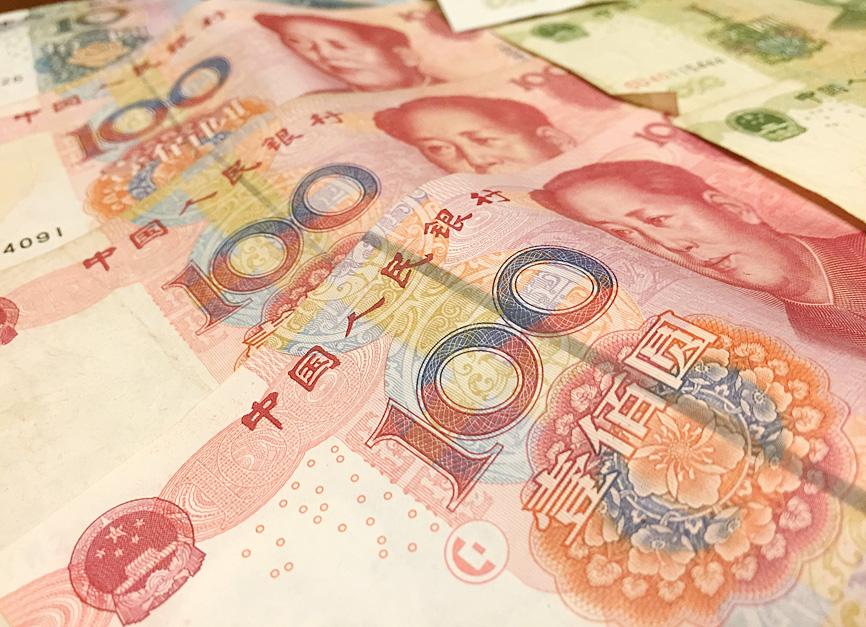Chinese yuan deposits held by local banks last month declined 0.91 percent to 225.32 billion yuan (US$34.66 billion), shrinking for a fourth consecutive month, as corporate and retail clients adjusted asset portfolios amid inflation expectations and geopolitical tensions, the central bank said on Tuesday.
The decrease was related to personal and corporate decisions regarding asset allocation strategies, and was not connected to political circumstances, the bank said.
Major Asian currencies have been hit hard this year, partly by US Federal Reserve rate hike expectations and the Japanese yen weakening 10.11 percent against the US dollar, it said.

Photo: Kelson Wang, Taipei Times
The New Taiwan dollar fared better with a 5.27 percent correction, while the Chinese yuan held firm with a 0.04 percent dip, making it the best performer in the region, it said.
Yuan deposits at domestic banking units dropped 1.49 percent to 196.76 billion yuan after retail and corporate clients trimmed positions, the central bank said, adding that a major electronics firm had used yuan deposits for goods payments.
Yuan deposits at offshore banking units rose 3.24 percent to 28.56 billion yuan after some firms converted US dollar deposits into yuan holdings to meet yuan settlement needs, the bank said.

TRADE WAR: Tariffs should also apply to any goods that pass through the new Beijing-funded port in Chancay, Peru, an adviser to US president-elect Donald Trump said A veteran adviser to US president-elect Donald Trump is proposing that the 60 percent tariffs that Trump vowed to impose on Chinese goods also apply to goods from any country that pass through a new port that Beijing has built in Peru. The duties should apply to goods from China or countries in South America that pass through the new deep-water port Chancay, a town 60km north of Lima, said Mauricio Claver-Carone, an adviser to the Trump transition team who served as senior director for the western hemisphere on the White House National Security Council in his first administration. “Any product going

STRUGGLING BUSINESS: South Korea’s biggest company and semiconductor manufacturer’s buyback fuels concerns that it could be missing out on the AI boom Samsung Electronics Co plans to buy back about 10 trillion won (US$7.2 billion) of its own stock over the next year, putting in motion one of the larger shareholder return programs in its history. South Korea’s biggest company would repurchase the stock in stages over the coming 12 months, it said in a regulatory filing on Friday. As a first step, it would buy back about 3 trillion won of paper starting today up until February next year, all of which it would cancel. The board would deliberate on how best to effect the remaining 7 trillion won of buybacks. The move

China’s Huawei Technologies Co (華為) plans to start mass-producing its most advanced artificial intelligence (AI) chip in the first quarter of next year, even as it struggles to make enough chips due to US restrictions, two people familiar with the matter said. The telecoms conglomerate has sent samples of the Ascend 910C — its newest chip, meant to rival those made by US chipmaker Nvidia Corp — to some technology firms and started taking orders, the sources told Reuters. The 910C is being made by top Chinese contract chipmaker Semiconductor Manufacturing International Corp (SMIC, 中芯) on its N+2 process, but a lack

NVIDIA PLATFORM: Hon Hai’s Mexican facility is to begin production early next year and a Taiwan site is to enter production next month, Nvidia wrote on its blog Hon Hai Precision Industry Co (鴻海精密), the world’s biggest electronics manufacturer, yesterday said it is expanding production capacity of artificial intelligence (AI) servers based on Nvidia Corp’s Blackwell chips in Taiwan, the US and Mexico to cope with rising demand. Hon Hai’s new AI-enabled factories are to use Nvidia’s Omnivores platform to create 3D digital twins to plan and simulate automated production lines at a factory in Hsinchu, the company said in a statement. Nvidia’s Omnivores platform is for developing industrial AI simulation applications and helps bring facilities online faster. Hon Hai’s Mexican facility is to begin production early next year and the